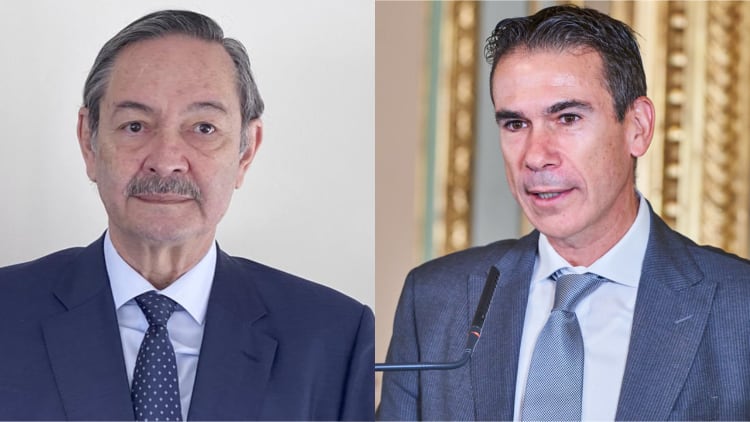Luis Ayllón
The government will appoint diplomat Enrique Ojeda as ambassador to Morocco, replacing Ricardo Díez Hochleitner, who has been in the post for eight and a half years, according to The Diplomat.
Diéz-Hochleitner turned 70, the maximum retirement age for diplomats, in June last year, but the government decided to continue to keep him in the post, despite the fact that he was appointed to the post in June 2015 by the government then led by Mariano Rajoy of the Popular Party.
Such a long period of time at the head of an embassy is unusual for Spanish diplomatic practices, but circumstances led the government of Pedro Sánchez to keep Díez-Hochleitner in the post, as relations with Morocco went through a very difficult moment in May 2021, when Rabat recalled its ambassador in Madrid, Karima Benyaich, for consultations in protest at the reception given by Spain to the leader of the Polisario Front, Brahim Ghali, who was treated for Covid in a hospital in Logroño.
The presence in Rabat of Díez-Hochleitner, well regarded by Mohammed VI’s entourage, helped calm the storm, which ended when, in March 2022, the government reversed Spain’s traditional position and backed Morocco’s autonomy proposal for the former Spanish territory. In this situation, with Morocco delighted by this change of position, the replacement of the ambassador was not considered opportune, and with the prospect of a High-Level Meeting between the two countries in February 2023, Sánchez opted to keep Díez Hochleitner. The electoral processes that followed made a change practically impossible in the following months.
Now, the government is preparing to send Enrique Ojeda to Rabat, an experienced diplomat, who joined the diplomatic career in 1994, and who, since July 2021, has been the director of Casa América, and who was previously ambassador to Chile, Bolivia and El Salvador.
Ojeda was also for four years, between 2004 and 2008, director of the Three Cultures Foundation, a body created in 1998 by the Government of Andalusia and the Kingdom of Morocco, and later joined by the Palestinian Authority and the Peres Centre for Peace, which promotes a variety of meetings and dialogue between peoples, cultures and religions of the Mediterranean. After his time at the Foundation, Enrique Ojeda was, for almost a year, Secretary General for External Action of the Andalusian Regional Government and, subsequently, Director General of Autonomous Cooperation in the Ministry of Territorial Policy.
Sánchez-Benedito, to Iran
Furthermore, sources consulted by The Diplomat indicated that the government already has a replacement for the Spanish ambassador to Iran, Ángel Losada, who retired last December and who ended his stay in Tehran by securing the release of the Spaniard Santiago Sánchez Cogedor, who had been detained in that country for 15 months.
The new ambassador will be Antonio Sánchez-Benedito, currently Ambassador-at-Large for the Sahel, who was previously Spain’s ambassador to Ethiopia and head of the European Delegation to Madagascar and Mozambique.
A diplomat since 1994, he has also been Deputy Director General for Sub-Saharan Africa and has served as Deputy Head of the Spanish Embassies in Angola, El Salvador and Mozambique.
Alonso Berrio to Bulgaria and Clara Girbau to Guatemala
On the other hand, The Diplomat was able to find out that the approvals have already been requested for the appointment of new ambassadors in some other countries, among them Bulgaria, where Miguel Alonso Berrio, current director of the Cabinet of the State Secretary for the European Union, will go to replace Alejandro Polanco.
This will be the first Embassy of Alonso Berrio, who has an extensive career in the diplomatic career, which he joined in 1994, and which has led him to be, among other things, Deputy Director General for EU countries, as well as ‘number two’ in the Spanish Embassies in Vienna, Prague and Bratislava.
Finally, Clara Girbau will be Spain’s new ambassador to Guatemala, replacing José Laviña, who this weekend will take part in one of his last acts in the post, during the inauguration of the new Guatemalan president, Bernardo Arévalo, which will be attended by His Majesty the King, accompanied by the Minister of Foreign Affairs, José Manuel Albares.
Clara Girbau, a diplomat since 1998, is currently stationed at the Permanent Representation of Spain in Brussels, and has been Ambassador-at-Large for the Promotion of Gender Equality and Reconciliation Policies and head of the Equality Unit of the Ministry of Foreign Affairs. She has also been posted to the West Africa Division of the European External Action Service and to the Spanish Embassies in Mauritania and Luxembourg.
These ambassadorial appointments join those already known for Washington, Beijing, Berlin, Lisbon, Vienna, Quito and Dakar, among others, which The Diplomat has already reported on, and which have been taking place since the new government of Pedro Sánchez took office, as well as the appointments of former ministers to the permanent representations at the UN (Héctor Gómez) and Unesco (Miquel Iceta).
Given this distribution of not only high-profile embassies, but also others of lesser importance, some diplomats have expressed concern about the effectiveness of the ’embabombo’ – in diplomatic jargon, a competition to apply for an embassy post – which was expected to take place in January. According to the sources consulted, they believe that this call does not make much sense if some embassies – and not only those of great importance – in which changes are expected to take place this year, are already being awarded, without waiting for the application process to take place.
In any case, it is estimated that, given the delays experienced in the replacements as a result of the elections and the long period in which the government has been in office, around fifty embassies or more will change hands in 2024.







